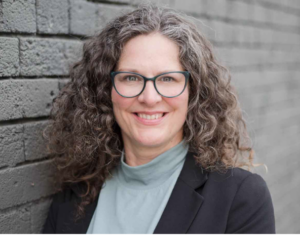
Debra Hawhee studies and teaches histories and theories of rhetoric, broadly defined as the art of effective communication.
Last semester, Hawhee devised a plan for a unique senior seminar — ENGL 487W, a climate rhetoric class. Hawhee was driven by the knowledge that writing-intensive classes work well with engaging social issues and her own expertise in the field.
Hawhee describes rhetoric as “how we make things matter to other people.” Her course asked students: “How do you make this complex crisis matter to people unable to see or comprehend the crisis and its slowly unfolding consequences?”
One standout workshop from the course had students creating “Greeting Cards from the Anthropocene.” This activity was led by Casey Boyle, associate professor in the Department of Rhetoric and Writing at the University of Texas at Austin.
“I think the workshop was a rousing success,” Hawhee said. “Students seemed to welcome the opportunity to get creative. The results ranged from clever and punning to searing.”
Fourth-year student Ryan Hall’s greeting card, for example, targeted climate change’s impact on the ocean. His card read, “Whale sea you soon.”
Hawhee’s course perfectly aligned with the College of the Liberal Arts’ theme for the 2022-23 academic year, “Moments of Change: Creating a Livable Planet.” Her focus on sustainability highlights the ongoing work of Liberal Arts students, faculty, staff, and alums in creating systemic change in our society.
Check out Hawhee’s new book, “A Sense of Urgency: How the Climate Crisis is Changing Rhetoric,” in production at the University of Chicago Press later this year.
This article references a Penn State Liberal Arts publication, found here.